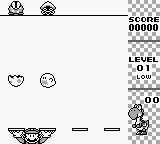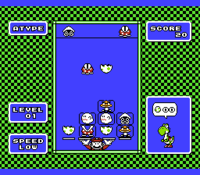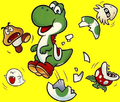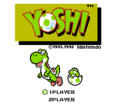Yoshi (game): Difference between revisions
(SMB Encyclopedia says both NES and GB versions were released on the 14th) Tag: Mobile edit |
LinkTheLefty (talk | contribs) m (Replaced English with Japanese.) |
||
| Line 5: | Line 5: | ||
|developer=[[Game Freak]] | |developer=[[Game Freak]] | ||
|publisher=[[Nintendo]] | |publisher=[[Nintendo]] | ||
|released='''Famicom/NES:'''<br>{{released|Japan|December 14, 1991<ref name= | |released='''Famicom/NES:'''<br>{{released|Japan|December 14, 1991<ref name=ESMB>Shogakukan. 2015. ''Super Mario Bros. Hyakka: Nintendo Kōshiki Guidebook'', appearances section, page 240.</ref>|USA|June 1992|Europe|December 30, 1992<ref>[http://www.themushroomkingdom.net/games/yoshi-nes Date info of the NES version from TMK]</ref>}} '''Game Boy:'''<br>{{released|Japan|December 14, 1991<ref name=ESMB/>|USA|July 1992|Europe|December 17, 1992<ref>[http://www.themushroomkingdom.net/games/yoshi-gb Date info of the GB version from TMK]</ref>}} '''Virtual Console (Wii):'''<br>{{released|Japan|March 6, 2007|USA|July 9, 2007|Europe|May 16, 2007|Australia|May 18, 2007|South Korea|August 12, 2008<ref>[http://www.nintendo.co.kr/Wii/wii/vconsol.php Korean Virtual Console game list, www.nintendo.co.kr]</ref>}} '''Virtual Console (3DS) (Ambassador Program Release):'''<br>{{released|Japan|August 31, 2011|USA|September 1, 2011|Europe|September 1, 2011|Australia|September 1, 2011}} '''Virtual Console (3DS) (Full Release):'''<br>{{released|Japan|August 22, 2012|USA|February 21, 2013|Europe|May 2, 2013|Australia|May 2, 2013}} '''Virtual Console (Wii U):'''<br>{{released|Japan|June 12, 2013|USA|June 12, 2013|Europe|June 13, 2013|Australia|June 13, 2013}} '''Nintendo Entertainment System - Nintendo Switch Online:'''<br>{{released|USA|September 18, 2018|Japan|September 19, 2018|Europe|September 19, 2018|Australia|September 19, 2018|HK|April 23, 2019|South Korea|April 23, 2019}} | ||
|genre=Puzzle | |genre=Puzzle | ||
|modes=1-2 players in a same system | |modes=1-2 players in a same system | ||
Revision as of 10:57, August 8, 2020
Template:Infobox Yoshi, known in Europe and Australia as Mario & Yoshi and in Japan as Yoshi no Tamago (ヨッシーのたまご, lit. "Yoshi's Egg"), is a puzzle game for the NES and Game Boy featuring the titular character. In this game, the player must stack two of the same Mario enemy on top of one another to clear them. The concept of the game was inspired by Tetris.
The NES version of this game was later released on the Virtual Console for the Wii in 2007, the Nintendo 3DS in 2011, and the Wii U in 2013. It was also made available as one of the 20 NES titles at the Nintendo Switch Online service's launch in September 2018.
Game modes
1-Player Mode
In this mode, only one player who controls Mario plays the game. There are two "types" of game to play, the A Type, and B Type. Before each game, the player sets the type of game, level of difficulty, speed of falling enemies, and in-game music for the game ahead. A board is made out of four "plates" which enemies fall onto. Mario uses left and right on the D-Pad to move about, and the (
![]() on Wii Virtual Console) and
on Wii Virtual Console) and (
![]() on Wii Virtual Console) Buttons to make two plates switch places. In the NES version, each plate can hold up to 8 characters, while in the Game Boy version, the max is 7.
on Wii Virtual Console) Buttons to make two plates switch places. In the NES version, each plate can hold up to 8 characters, while in the Game Boy version, the max is 7.
Mario must match the enemy icons to earn points and, hopefully, make a high score. Any two enemies placed together vertically make a match, earning Mario five points. A very handy way of clearing excess enemies from the board are egg halves. There are two halves that stack together to make a full egg, thus hatching a Little Yoshi and getting fifty points for Mario. When a top half is placed by itself on the board, it will dissipate. But if a bottom piece is placed, there it will stay until another falls on top of it for an ordinary match, or a top piece stacks onto it.
A handy little tip is that no matter how many enemies are on top of the bottom egg piece, if the top piece is placed on the same stack as the bottom, it will plow through the entire stack until it reaches its other half. This is also a big point boost, as any enemy inside the stack equals fifty points. It will also result in a larger Yoshi hatching from the egg. The levels of Yoshis are as follows:
| Yoshi | Enemies (NES) | Enemies (GB) | Points |
|---|---|---|---|
Little Yoshi |
0-1 | 0 | 50 |
Yoshi |
2-4 | 1-3 | 100 |
Winged Yoshi |
5-6 | 4-5 | 200 |
Star Yoshi |
7 | 6 | 500 |
A Type
As the game progresses, more and more enemies come down, faster and faster. The game never ends, though. The only point is to make a high score. If the player has hatched at least 10 Yoshi's eggs before Game Over, a bonus chance will occur. Four eggs will appear on screen and hatch in succession. The player must press the A button as the eggs hatch, for a chance to earn some extra points. The better timed the press is, the better the Yoshi that is awarded. Besides Yoshi, the content in the eggs will change depending on how many were hatched before the game ended. If 100 eggs are hatched, Yoshi will continously dance under the egg counter, and upon reaching Game Over, the game will congratulate the player as a "super player".
| Eggs | Item (NES) | Item (GB) |
|---|---|---|
| 10 | Little Goomba |
Mushroom |
| 20 | Piranha Plant |
Fire Flower |
| 30 | Boo Buddy |
Super Star |
| 40 | Bloober |
Boo Buddy |
| 50 | Bob-omb | |
| 60 | Cheep Cheep |
Bob-omb |
| 70+ | Super Star |
Cheep Cheep |
B Type
Exactly like the A Type, but now games are timed. When the board is completed, not only is the score recorded, but also the amount of time spent on that game. Between levels, a short cutscene will play. Mario will ride Yoshi from the background to the foreground where he swallows an enemy or item, awarding bonus points.
| Level | Reward | Bonus Points |
|---|---|---|
| 1 | Mushroom |
50 |
| 2 | Fire Flower |
100 |
| 3 | Piranha Plant |
150 |
| 4 | Red Shell |
200 |
| 5 | Super Star |
250 |
| 6-7 | Apple |
300 |
| 8-9 | Strawberry |
400 |
| 10-11 | Melon |
500 |
| 12-13 | Peach |
600 |
| 14-15 | Grapes |
700 |
| 16-18 | Pineapple |
800 |
| 19-21 | Cherry |
900 |
| 22-24 | Key |
1000 |
| 25-27 | Coin |
1200 |
| 28+ | P Switch |
1500 |
2-Player Mode
Before a player face-off, each one picks their own level and speed. The game is played with B Type rules. On the NES, the board is now split in half, left half for Player 1, Mario, right half for Player 2, Luigi. On the Game Boy, a counter is present comparing the number of enemies left on screen for both players. Enemies that become sandwiched between two egg shells will be sent to the other player's side as garbage blocks. If a player loses, they gain an "X", while the winning player (whoever was still alive when his opponent lost) gains an "O". An "X" simply signifies a lost game, and "O", one won. Won games are recorded on the upper part of each player board by Yoshi's eggs. If a player has three eggs, they win.
Characters
- Mario (Playable)
- Luigi (Playable)
- Yoshi
- Little Yoshi
- Little Goomba
- Bloober
- Boo Buddy
- Piranha Plant
Appearances in other media
Yoshi was the subject of a manga called Yoshi's Egg by Kazuki Motoyama, who later went on to write a manga based on Super Mario World 2: Yoshi's Island. It has two different stories. The first story involves Yoshi opening a restaurant called Yossy's Pizza (note that the Yossy in the name was how Yoshi's name was anglicized in Japan at the time). And the second story (divided into three separate parts) involves Yoshi, Mario, Luigi, and Peach embarking on a journey to find his mother.
Reception
Yoshi received mixed to negative reviews for its repetitive and luck-based gameplay. Brett Alan Weiss of Allgame said that Yoshi was a "surprisingly dull game" and he noted that the controls were unique, but he also added; "the novelty wears off after a while."
N-Force gave the game a positive review saying that in a preview for the game that it was "basically the game is great. The fun of Tetris, but with color and sound effects. Just as hard, maybe harder - definitely just as addictive." They later rated the game 4/5 stars in the Buyer's Guide for the Jan. 1993 issue saying that "Yoshi is great fun. Gameplay's nothing new - Tetris all over again! Graphics are a treat. Lots of fun - in short bursts."
Despite the negative reviews, the game sold well and helped Game Freak create the first Pokémon games.
The Virtual Console re-release also received negative reviews. GameSpot's Frank Provo and IGN's Lucas M. Thomas both gave the game 5 of 10 stars, with Thomas commenting the game's "slow" gameplay and the "cumbersome" controls.
Several video game websites said that players should refrain from buying Yoshi on the Wii Shop Channel. Nintendo World Report said; "There was too much luck and chance in the game to make playing it satisfying." Joystiq said; "While [the gameplay is] admittedly a pretty interesting way to spend an afternoon, it still feels kind of a ripoff."
1UP.com's Jeremy Parish stated that the gameplay was "not enough to justify the asking price" (500 points), but he later stated that, compared to Yoshi's Cookie, it was "decent and actually had some relationship to the Mario series."
References to other games
- Super Mario Bros. 3: Mario's sprite from this game appears on the high score board. All of the enemies look identical to their sprites from Super Mario Bros. 3 (with the exception of Piranha Plants)
- Super Mario World: Yoshi's many forms and the Piranha Plants' design are from this game.
References in later games
- Pokémon Red & Blue: A portion of the Star theme sounds identical to the first few notes of the Pokémon Center theme used in that game. This is evidenced in the Game Boy version.
- Super Mario Bros. Deluxe: The image that appears when Yoshi is brought to Toad after hatching him is similar to the image in the title screen of the NES version.
- Super Smash Bros. for Wii U: A demo of the game can be played after beating Classic Mode with Yoshi in Intensity 2.0 or higher.
Pre-release and unused content
An unused title screen graphic (pictured at the left) depicting a Little Yoshi is found in the game files. In the Game Boy version, an unused Bullet Bill can also be found (pictured at the right).
Gallery
- For this subject's image gallery, see Gallery:Yoshi (game).
Media
Names in other languages
| Language | Name | Meaning | Notes |
|---|---|---|---|
| Dutch | Mario en Yoshi[?] | Mario and Yoshi | |
| German | Mario und Yoshi[?] | Mario and Yoshi | |
| Italian | Mario e Yoshi[?] | Mario and Yoshi | |
| Korean | 요시의 알[?] Yosi ui al |
Yoshi's Egg | |
| Portuguese | Mario e Yoshi[?] | Mario and Yoshi | |
| Russian | Марио и Йоши[?] Mario i Yoshi |
Mario and Yoshi | |
| Spanish | Mario y Yoshi[?] | Mario and Yoshi |
References
Template:Yoshi (game) Template:YoshiGames
| Game Boy games | |
|---|---|
| Super Mario franchise | Alleyway (1989) • Baseball (1989) • Super Mario Land (1989) • Golf (1989) • Dr. Mario (1990) • Super Mario Land 2: 6 Golden Coins (1992) • Donkey Kong (1994) • Mario's Picross (1995) • Picross 2 (1996) |
| Donkey Kong franchise | Donkey Kong (1994) • Donkey Kong Land (1995) • Donkey Kong Land 2 (1996) • Donkey Kong Land III (1997) |
| Yoshi franchise | Yoshi (1991) • Yoshi's Cookie (1992) • Tetris Attack (1996) |
| Wario franchise | Wario Land: Super Mario Land 3 (1994) • Wario Blast: Featuring Bomberman! (1994) • Wario Land II (1998) |
| Miscellaneous | Tetris (1989) • The Legend of Zelda: Link's Awakening (1993) • Game & Watch Gallery (1997) • Game & Watch Gallery 2 (1997) |







